









|

I love to go fishing. Be it salt or fresh water, there is nothing finer than
spending the day casting to the spiny creatures. Below are a few of my favorite
species . Always eat what you keep and release what you won't. The fisheries
will continue to provide for everyone if conservation is practiced.
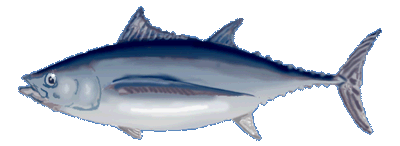
|
Thunnus alalunga -
First up is the wiley albacore tuna, a yearly migrant on the west coast of
California. The albacore is the finest eating tuna in the world, referred to as
the 'chicken of the sea'. Albacore range to 80 lbs and are caught where warm
water currents meet the cold. Albacore fight relentlessly and are regarded as
the west coast's finest game fish. Be sure to hook into one soon!
|

|
Oncorhynchus tshawytscha -
The mighty chinook or king salmon is found in the cold water currents of the
west coast from California to Alaska. The largest of all salmon, the king can
reach sizes of 80 pounds or more. Caught by trolling or drifting bait, the king
is an avid fighter on light tackle. Prized for its deep red flesh, there is
nothing better than a king salmon steak barbequed or broiled to perfection.
|

|
Ophiodon elongatus -
Tucked away in the rocky pinnacles of the west coast shoreline is the
voracious lingcod. The lingcod is neither a cod nor a rockfish, but a member of
the greenling family. Truely the 'wolf of the sea', the lingcod will persue and
eat other fish which nearly equal its size. The ling can grow to 60 pounds and
are extremely longed lived, perhaps 100 years or more. The fish's color ranges
from a blue or green to a mottled rust pattern. Lingcod can be found from 500
feet to the surface and require heavy tackle to coax them out of the rocks.
|
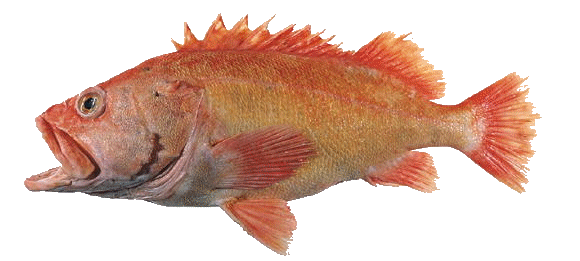
|
Sebastes ruberrimus -
Tucked in the coastal rocks from 800 feet to the surface are the rockfish
family Scorpaenidae. There are over 5000 different types of rockfish found
along the west coast of the United States. The fishery is extremely popular for
sportsmen and also supports a large commercial fleet. Usually marketed as 'Red
Snapper' the rockfish has a firm white tastey flesh. These are mostly bottom
fish and require heavy tackle and weight to reach the great depths.
|
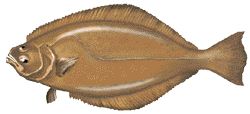
|
Paralichthys californicus -
The California Halibut is an interesting fish. The halibut starts out life
with eyes on both sides of its head. But soon thereafter one eye migrates to
the other side of the head and the fish begins the life of a flatfish.
California Halibut occur from Baja California to British Columbia. The largest
California halibut on record was 5 feet long and 72 pounds, smaller than the
Pacific halibut. They lay on sandy bottoms waiting for baitfish to swim over
them and then savagely attack. Their white firm flesh is excellent eating.
|
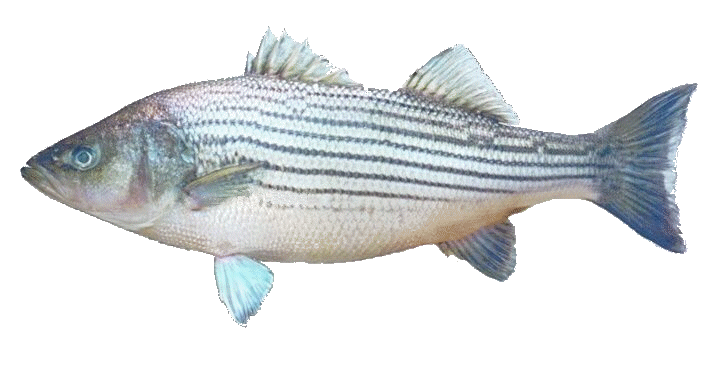
|
Morone saxatilis -
The natural habitat of the stripped bass is along the Atlantic coast, where it
occurs in saltwater and enters the lower parts of rivers. Introduced to the
west coast in the late 1800's it quickly established itself as a premire
gamefish. It migrates along the Califronia central valley rivers into the San
Francisco bay delta waters and from there into the Pacific ocean along the
coast. The bass feeds on live baitfish with exuberance and can attain the
weight of 60 pounds.
|
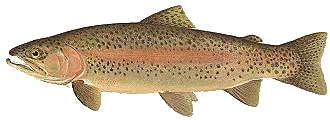
|
Oncorhynchus mykiss -
Switching over to fresh water, we find the worlds most prolific gamefish, the
rainbow trout. Introduced and planted in lakes and rivers all over the world,
the rainbow accounts for the bulk of the worlds sports fishery. Attaining a
maximum weight of 12 pounds, the rainbow is caught by trolling, bait fishing or
fly casting. It has white delicate flesh and is prized as a table delicacy.
|
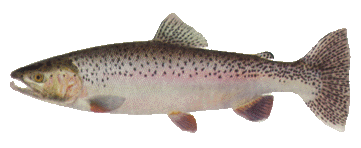
|
Oncorhynchus mykiss -
When a rainbow trout can reach the sea, it begins a feeding migration and
returns to the same river of its birth to spawn. These fish are known as
Steelhead trout. Unlike the salmon, which will die after spawning, the
steelhead can return to the sea and repeat the spawning cycle. The ocean
journey and abundant food allow the steelhead to grow bigger than its land
locked rainbow cousins. Steelhead are rarely caught in the oceans, but
individuals reaching 35 pounds have been caught in the west coast rivers.
|
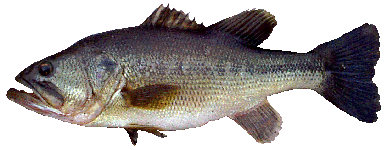
|
Micropterus salmoides -
The large mouth bass has become something of a celeberity fish. Anglers fish
for them from sleek bass boats with hi tech electronics. They bring along a
selection of high-tech rods, and wear designer bassing clothes. They win 6
figure amounts in bassing tournaments. The fish don't know this of course.
The bass are just as fun to catch as they always were. Find a warm shallow
pond, sit down and plunk lures to your hearts delight. They don't taste bad,
but it's usually catch and release for these guys.
|
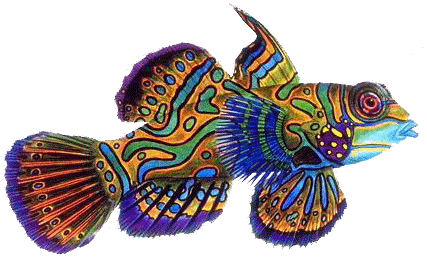
|
Omigudwha dahelisit -
Lance's Capazon. No one has ever actually seen one except Lance. It scared
him so much he threw it back and quit going fishing without a sun hat. We've
all tried to catch it again, but no luck so far. Click on the funny lookin guy
to go to my
fishing links
page.
|
© copyright 2000, Geoffrey Wells. All rights reserved
|
|











